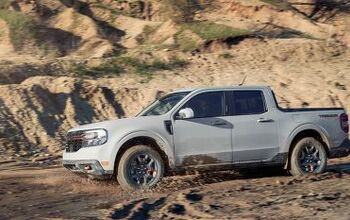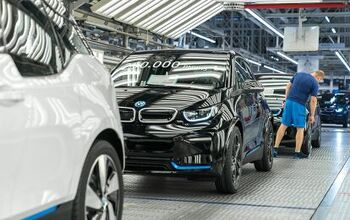(Not) Coming To America: China's Best-selling Automaker Fingers Trump for Decision to Avoid U.S.

SAIC Motor, China’s largest state-owned automotive manufacturer, is canceling its plans to export vehicles into North America. Likely fearful of the current administration’s trade proposals, SAIC is blaming President Donald Trump for its hesitation to enter the Western market.
Of course, the Chinese automaker isn’t ruling anything out entirely. Michael Yang, the executive director of SAIC’s international division, explained at the Shanghai motor show that the company might resume its plans for U.S. expansion once trade tensions ease between the two countries. As the Trump administration hasn’t exactly celebrated the idea of imported goods and foreign manufacturing, it could be a long wait. In the meantime, SAIC Motor will be focusing its efforts on the European market.
Despite President Trump having softened his stance on Chinese trade in the recent months, much of his campaign rhetoric accused the country of unfair trade practices, and he has threatened to implement stiff tariffs on imported products. The current atmosphere isn’t ideal for SAIC — or any Chinese carmaker — to rush headlong into America. “Eventually we aim to have all, but at the moment we are focusing on [China and then Europe],” Yang said. “The reason is the ‘climate change’ after the new presidency.”
The changing of the guard hasn’t kept other automakers from testing the waters, however. According to Bloomberg, Guangzhou Automobile Group is continuing its plan to establish a research center in the United States in order to conduct a preliminary study of the North American market. Yu Jun, the general manager of the company’s Trumpchi subsidiary, announced at the Shanghai show that his company anticipates entering the U.S. no later than 2019.
“Trumpchi’s goal is to become a world-class Chinese brand,” said Yu. “And we would like to make our research, production and sales global.”
That seems overly ambitious.
While Geely has managed to enter the West indirectly via its purchasing of Volvo, and might eventually rollout its Lynk & Co branded vehicles, other Chinese automakers have been spinning their wheels. BYD has been making appearances at American automotive shows for years under a similar premise without making any real headway.
It would seem that corporate partnerships are the best way to ease into the States, and many of those already exist. Guangzhou already has an alliance with Fiat Chrysler and SAIC’s limited partnership with General Motors is the only way it can legally sell Chevrolet, Buick, and Cadillac models in mainland China. That cooperation is also how the Chinese-built Buick Envision has made its way to Western shores.
It looks as if SAIC has made it into North America already.
[Image: SAIC Motor]

A staunch consumer advocate tracking industry trends and regulation. Before joining TTAC, Matt spent a decade working for marketing and research firms based in NYC. Clients included several of the world’s largest automakers, global tire brands, and aftermarket part suppliers. Dissatisfied with the corporate world and resentful of having to wear suits everyday, he pivoted to writing about cars. Since then, that man has become an ardent supporter of the right-to-repair movement, been interviewed on the auto industry by national radio broadcasts, driven more rental cars than anyone ever should, participated in amateur rallying events, and received the requisite minimum training as sanctioned by the SCCA. Handy with a wrench, Matt grew up surrounded by Detroit auto workers and managed to get a pizza delivery job before he was legally eligible. He later found himself driving box trucks through Manhattan, guaranteeing future sympathy for actual truckers. He continues to conduct research pertaining to the automotive sector as an independent contractor and has since moved back to his native Michigan, closer to where the cars are born. A contrarian, Matt claims to prefer understeer — stating that front and all-wheel drive vehicles cater best to his driving style.
More by Matt Posky
Latest Car Reviews
Read moreLatest Product Reviews
Read moreRecent Comments
- Brian Uchida Laguna Seca, corkscrew, (drying track off in rental car prior to Superbike test session), at speed - turn 9 big Willow Springs racing a motorcycle,- at greater speed (but riding shotgun) - The Carrousel at Sears Point in a 1981 PA9 Osella 2 litre FIA racer with Eddie Lawson at the wheel! (apologies for not being brief!)
- Mister It wasn't helped any by the horrible fuel economy for what it was... something like 22mpg city, iirc.
- Lorenzo I shop for all-season tires that have good wet and dry pavement grip and use them year-round. Nothing works on black ice, and I stopped driving in snow long ago - I'll wait until the streets and highways are plowed, when all-seasons are good enough. After all, I don't live in Canada or deep in the snow zone.
- FormerFF I’m in Atlanta. The summers go on in April and come off in October. I have a Cayman that stays on summer tires year round and gets driven on winter days when the temperature gets above 45 F and it’s dry, which is usually at least once a week.
- Kwik_Shift_Pro4X I've never driven anything that would justify having summer tires.


































Comments
Join the conversation
They could always come in and partner with a US manufacturer to set up local production, you know, exactly how the Chinese deal with any car maker that wants to sell there (or else deal with crazy tariffs). GMs are chock full of Chinese components already, I suppose this is the natural progression of things. The Chinese made some decent inroads in the Russian market, ultimately they had more success in the commercial large vehicle market (dump trucks, cab over engine delivery type trucks, buses). The first few years of Chinese cars were abysmal: crazy rust within 3-4 years, interior/exterior trim failing, headlights discoloring, etc. The powertrains are generally okay (tried and true Mitsubishi and Toyota 4cyl knockoffs from 20 years ago). "Great Wall" Hilux pickup knockoffs got a decent amount of traction, and the Great Wall Hover series (Isuzu Axiom chassis knockoff, Mitsubish 2.4L gas engines, front styling like a Land Cruiser Prado) are considered to be decent bang for the buck, reliability is a middle ground between Russian makers and foreign ones (Japanese/Korean/etc).
This lot are only slightly more dishonest than "The Phoenix Four" who sold them MG during a drinking session and BMW before that. I have seen approximately three (that's between two and five) "Modern Gentlemans" on the road and they all looked shit. Even low price couldn't pursuade buyers here. They partially assembled a few in the old Rover Longbridge plant in order to say that if they were good enough to be made in the UK then they're good enough for you in China. I think they have a joint venture with GM so you'll be getting some bits of them anyway in a Buick. Before you laugh remember they are coming. There was nearly 25 years between the first Toyota Crown sold in the USA and the first Camry. Compared to them, the Japanese are impatient. That's a Donald Fact.